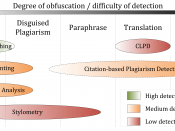Topic: Lack of competency English language is often blamed for the many challenges that overseas students face in their university study. However, differences in assessment cultures may be of equal if not greater importance in explaining these challenges. Discuss with particular reference to the issue of plagiarism.
What is plagiarism? According to Handa & Power (2005), Plagiarism is defined as "â¦borrowing the words and ideas of others and using them in one's writing or work without acknowledging the original source"(p66). Not only is plagiarism a serious form of academic misconduct but has also been abundant in all universities for decades causing many problems. Students from overseas especially, with lack of competency in the English language and cultural differences are often the main factors that challenge their university studies and thus results to plagiarism.
Competency in the English language is one of the major challenges that many overseas students face in their studies.
However it is also acknowledged that other factors also contribute to plagiarism. These factors include students' understandings and perceptions toward cultural differences, financial pressure to succeed and their different moral perceptions of plagiarism and its significance (Introna et al., 2003).
This essay will discuss the many challenges that overseas students face in their university studies that results some to plagiarize. Arguing that the lack of competency English language and differences in assessment cultures do lure overseas students into plagiarism.
The concern about plagiarism by overseas students has grown rapidly since the numbers of international students attending western institutions are increasing significantly (Marshall & Garry, 2005). International students are seemed to be attached with some stigma, so is their role in the issue of plagiarism. Often those students are rote-learners who are "persistent plagiarizers" (Handa & Power, 2005). As there is a diverse student population of Non English...



Solid and strong.
Solid and strong.
0 out of 0 people found this comment useful.